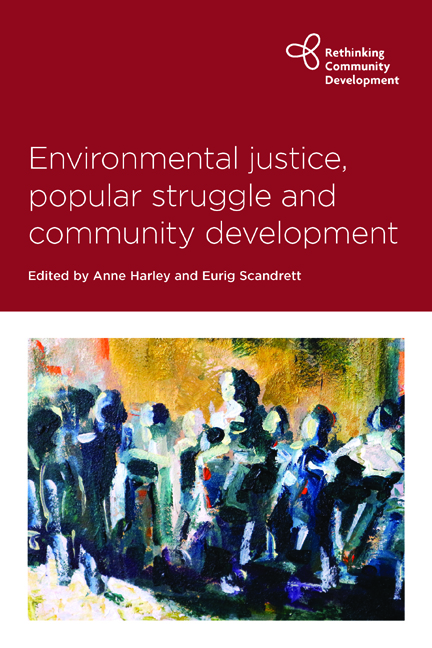Book contents
- Frontmatter
- Dedication
- Contents
- List of figures
- Series editors’ preface: Rethinking Community Development
- Preface
- Acknowledgements
- Notes on contributors
- Abbreviations
- One Community, development and popular struggles for environmental justice
- Two Resisting Shell in Ireland: making and remaking alliances between communities, movements and activists
- Three ‘No tenemos armas pero tenemos dignidad’: learning from the civic strike in Buenaventura, Colombia
- Four No pollution and no Roma in my backyard: class and race in framing local activism in Laborov, eastern Slovakia
- Five Tackling waste in Scotland: incineration, business and politics vs community activism
- Six An unfractured line: an academic tale of self-reflective social movement learning in the Nova Scotia anti-fracking movement
- Seven ‘Mines come to bring poverty’: extractive industry in the life of the people in KwaZulu-Natal, South Africa
- Eight Ecological justice for Palestine
- Nine Learning and teaching: reflections on an environmental justice school for activists in South Africa
- Ten The environment as a site of struggle against settler-colonisation in Palestine
- Eleven Communities resisting environmental injustice in India: philanthrocapitalism and incorporation of people’s movements
- Twelve Grassroots struggles to protect occupational and environmental health
- Conclusion
- Index
Nine - Learning and teaching: reflections on an environmental justice school for activists in South Africa
Published online by Cambridge University Press: 27 April 2022
- Frontmatter
- Dedication
- Contents
- List of figures
- Series editors’ preface: Rethinking Community Development
- Preface
- Acknowledgements
- Notes on contributors
- Abbreviations
- One Community, development and popular struggles for environmental justice
- Two Resisting Shell in Ireland: making and remaking alliances between communities, movements and activists
- Three ‘No tenemos armas pero tenemos dignidad’: learning from the civic strike in Buenaventura, Colombia
- Four No pollution and no Roma in my backyard: class and race in framing local activism in Laborov, eastern Slovakia
- Five Tackling waste in Scotland: incineration, business and politics vs community activism
- Six An unfractured line: an academic tale of self-reflective social movement learning in the Nova Scotia anti-fracking movement
- Seven ‘Mines come to bring poverty’: extractive industry in the life of the people in KwaZulu-Natal, South Africa
- Eight Ecological justice for Palestine
- Nine Learning and teaching: reflections on an environmental justice school for activists in South Africa
- Ten The environment as a site of struggle against settler-colonisation in Palestine
- Eleven Communities resisting environmental injustice in India: philanthrocapitalism and incorporation of people’s movements
- Twelve Grassroots struggles to protect occupational and environmental health
- Conclusion
- Index
Summary
Introduction
‘I live in a highly polluted community called Merebank [in south Durban] that is surrounded by industries. I want to learn more about how they are affecting the environment and how these effects are impacting on our health.’
‘Growing up in a rural village I was surrounded by nature. When I went to primary school I used to cross two streams. On some days I could not go to school because the streams were overflowing and I ran the risk of being swept away. When I got to high school I still had to cross the two rivers. There was no longer the risk of being swept away, not because I was getting bigger, but because the water also became less and less. This bothered me. It's water. Water is important!’
‘There is a notable reduction in space for action by Mozambican civil society, particularly for organisations that work with controversial issues (resettlement of communities, mining). Our organisation is regarded by government as anti-development.… The multinationals act as if they own this land, they grab, displace families and steal land, intimidate and use violence before the eyes of our unfazed governors.’
This chapter focuses on the Environmental Justice School (EJS) run by the environmental justice NGO, groundWork. Over four successive schools (of 20 people at a time, selected in pairs from the different organisations), participants have included black working-class men and women from both urban and rural spaces, mostly members of community-based organisations or activist groups. As the overleaf quotations, written by participants before their arrival at the school indicate, their contexts vary. Most live on the fencelines in urban areas and confront the consequences of industrial pollution and mineral extraction. Given the high rate of unemployment in South Africa, most are unemployed, apart from the self-employed waste pickers, who recycle waste for a livelihood. Those who live in rural spaces encounter environmental challenges of a different order and they increasingly have to defend their land against enclosure, notably by the mining industries. A few participants come from environmental NGOs. Over the years most have been South Africans, with a sprinkling from Namibia, Mozambique, Zimbabwe, Angola, Kenya and one from Sweden.
- Type
- Chapter
- Information
- Publisher: Bristol University PressPrint publication year: 2019

